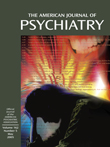Risperidone and Haloperidol in First-Episode Psychosis: A Long-Term Randomized Trial
Abstract
OBJECTIVE: The first episode of psychotic illness is a key intervention point. The initial experience with medication can affect willingness to accept treatment. Further, relapse prevention is a treatment cornerstone during the first years of illness because active psychotic illness may affect lifetime outcomes. Thus, initial treatment of active symptoms and subsequent relapse prevention are central goals of pharmacotherapy. This study compared long-term effectiveness of risperidone versus haloperidol in first-episode psychosis patients. METHOD: First-episode psychosis patients (N=555, mean age=25.4 years) participated in a double-blind, randomized, controlled flexible-dose trial that compared risperidone (mean modal dose=3.3 mg) and haloperidol (mean modal dose=2.9 mg). The median treatment length was 206 days (maximum=1,514). RESULTS: Positive and Negative Syndrome Scale scores and Clinical Global Impression ratings improved significantly relative to baseline, with no significant differences between groups. Three-quarters of the patients achieved initial clinical improvement, defined as >20% reduction in total Positive and Negative Syndrome Scale score. However, among those who achieved clinical improvement, 42% of the risperidone group experienced a relapse compared with 55% of the haloperidol group. The median time to relapse was 466 days for risperidone-treated subjects and 205 days for those given haloperidol. These differences were statistically significant based on Kaplan-Meier survival analysis. Adverse effects distinguished the treatments: there were significantly more extrapyramidal signs and symptoms and adjunctive medication use in the haloperidol group and greater prolactin elevation in the risperidone group. There was less weight gain with haloperidol initially but no significant differences between groups at endpoint. CONCLUSIONS: Relatively low doses of antipsychotic drugs lead to significant symptom amelioration in the majority of first-episode psychosis patients. In the long term, risperidone prevents relapse in more patients and for a longer time and also induces less abnormal movements than haloperidol.



